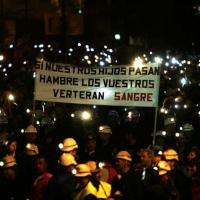EU/IMF bank bailout only scrapes tip of iceberg
Danny Byrne, CWI
The crisis in Spain is such that developments come and go at lightning speed and are difficult to predict or anticipate exactly. What will happen next in Spain is intrinsically linked up with a whole number of factors, many of which are determined outside of its borders, not least the playing out of the Eurozone crisis. Spain is becoming the new epicentre of this crisis, pushed into that position by the explosion of the massive banking crisis, which has begun to unravel and has already led to the acceptance of a humiliating EU/IMF bailout of up to 100 billion euros to rescue the bad debts of the banking sector.
Added and connected to the banking disaster are a plethora of social, regional, national and political crises, each one in itself threatening to explode at any moment. If anything has been capable of re-assuring the dismayed capitalist leaders of Greece, Portugal, and other countries beset by the unending chain of chaos and instability, it has been that the crisis of the Spanish government has temporarily taken some of the heat off of their own plights. With breath-taking speed the Spain’s government has gone from arrogant strong-man to fumbling sick man. As a Wall Street Journal editorial from last week widely quoted in the Spanish capitalist press put it, the problems of Spain’s new Prime Minister, Mariano Rajoy, are “massive and simultaneous” (El Pais, 4 June, 2012).
As it fell, the Zapatero government was frantically scrambling to avoid a Troika bailout and combat the black cloud of ’risk premium’, which has determinedly mushroomed despite the government’s most earnest servility to the markets. Now, just a few months after Zapatero’s hammering by the electorate and the PP’s rise to power as a ’safe pair of hands’ to bring an end to uncertainty in Europe and the markets, the spectre of “intervention” has returned. This brings home the dramatic (and inevitable) failure of Spanish capitalism, under two separate governments, to put up a wall between the Spanish situation and that of other “peripheral” countries, which have already received bailouts.
The brutal austerity policies, with new measures systematically announced every Friday by the government, have had the same effect in Spain as elsewhere – they have dragged the economy further towards a depressionary spiral. Alongside the conveyor belt of negative statistics and predictions, a social nightmare is developing for millions. Mass unemployment is steadily worsening (over half of youth are without work) against a backdrop of grinding poverty, which is evidenced on almost every street corner. Those who only a few years ago enjoyed regular and seemingly stable work are seen rummaging in dustbins for food.
This flagrant contradiction – between a Spanish capitalism which struggles to remain in the “premier league” and a working class with its living conditions being driven down towards third world levels in a hopeless bid for a ’way out’ of the crisis – is set to be the determining factor in shaping the events of the coming period. To get a glimpse of the intensity of the new class battles which will continue to develop even more widely, one need look no further than the militant struggle of the miners in the north of Spain, who have erected flaming barricades on motorways and railway lines around the country and defended them with home-made rocket launchers, in some towns successfully driving out the police.
An indefinite strike of miners has been underway for days in Asturias and Leon, which has been joined by transporters. Major daily clashes are taking place, with scenes reminiscent of a civil war situation in the mining communities being widely circulated on the internet. These scenes of pitched battles between workers’ pickets and riot police armed with guns firing rounds of rubber bullets will have an electrifying effect in a country brewing with anger and a growing desire to fight back, which is why the strike was blacked out of the capitalist press for a number of days. The deepening of the crisis has generally been accompanied by rising levels of resistance.
EU/IMF bailout – no solution to fundamental problems of economy
A satirical cartoon widely circulated in the last week, pictures Internal Affairs Minister Christobal Montoro saying “the bailout of Spain will be realized when the most adequate euphemism is found to define it”. The reality is that, in real terms, the Rajoy government has been pleading for a bailout for weeks. But its objective is to get a bailout of a more face-saving variety than those doled out in Ireland, Portugal and Greece.
First of all, they said that a bailout was not necessary because of the capacity of the ECB to intervene with a massive buy-up of government and banking debt (i.e. a bailout, by any logic) to ease the pressure, which had already prevented a Troika bailout in December 2011. When this was not forthcoming, the government’s approach changed. Now it was not Spain that needed a bailout, but only the banks! This defies the logic of the whole debt crisis: one of the main reasons why the markets have been taking for granted that Spain needs a bailout is precisely because they believe that it is not capable of bailing out its own banks. Thus, in a desperate attempt to avoid an Irish-style scenario (where the government was in effect bankrupted by its banking guarantee and forced into a bailout), the right-wing People’s Party (PP) government began to demand a European bailout directly to the banks, without having to pass through the government.
The speed of the latest banking crisis, with the trigger of the collapse and nationalisation of Bankia (the fourth largest bank in Spain), has been breathtaking. Only a few days after Bankia’s chairman vowed that the firm was capable of solving its own financing problems, it was already in need of an emergency nationalisation. The public cost of this “nationalisation” and recapitalisation then went in another few days from 4 billion to almost 25 billion euros. The pathetic unpreparedness of Spanish capitalism for the advent of this crisis is revealed by the fact that their Fund for Orderly Bank Re-structuring (FROB) which was set up under a recent finance reform to provide a ’cushion’ to the banking sector, contained barely more than €5 billion at the time of the Bankia collapse.
In comparison with other peripheral economies, such as Ireland, the relatively low debt-GDP ratio in Spain has had a lot to do with the “unfinished” bank rescue programmes of 2008-2009. But then, instead of learning the lessons of the disastrous international experiences of nationalising bad banking debts, the PP government and European powers seem determined to repeat these situations step by step. The bailout of Bankia alone is set to send public debt up to 90 percent of GDP, above previous estimates. The €100 billion in fresh debt now being taken on by the public finances will send this figure shooting further upwards. How will this “ease the pressure” on the Spanish economy from the markets?
This is being billed as a “soft” bailout, limited to the financial sector and without a Troika austerity programme attached. However, despite the fact that the Spanish government’s policies are already largely shaped by the diktats of the Troika powers, the idea that this bailout will go without a hardening of anti-worker measures is laughable. The conditions put forward by the European Commission for a mere one-year delay of Spain’s 3 percent deficit limit target, which included an acceleration of pension reforms, a hardening of the labour reform and deteriorations to the unemployment pay system, give a small example of the “sacrifices” which will be demanded.
It is true that the size and importance of the Spanish economy gave Rajoy the room and bargaining power to prevent (so far) a Greek-style Troika bailout with all its blood-curdling conditions. Incidentally, this is a crushing blow to the right-wing fearmongers in Greece, Ireland and elsewhere, who base themselves on the idea that the Troika’s bluff cannot be called. But Spain will still be under the ’supervision’ of the “men in black”, as they have been referred to in the Spanish media, with the Troika’s austerity “recommendations” now becoming more like “impositions” with the added instrument of blackmail that is the bailout. Like the others, this bailout will be paid out in tranches (differentially structured instalments), with the threat of funds being withheld if the government “misbehaves”.
Whatever form a bailout of the Spanish banks takes, it will not consist of bailing out ordinary people, but of a disastrous policy of the public shouldering tens of billions of euros in bad private sector debt, ultimately to be paid for by bleeding workers, youth and the unemployed dry. A banks-only bailout also addresses only one of the planks of Spain’s public debt crisis, doing nothing to resolve its fundamental problems – the looming disasters in autonomous regions, for example, which the Spanish state would be equally incapable of responding to. Thus, while the initial bank rescue figure may seem “manageable” to European and Spanish capitalism, it could be a mere attempt at a ’quick fix’ which touches only the tip of the iceberg that is the deep crisis of Europe’s fourth largest economy.
The reality is that this bailout is motivated by capitalist governments needing to bend over backwards to the super-rich speculators, who through their idle savings and investments have the banks and economy by the throat. Greece’s upcoming elections on 17 June hold the prospect of working-class voters delivering a crucial blow to the capitalists’ austerity policies if Syriza is elected. This bailout of the Spanish banks is part of the preparation of European capitalism to try to handle the wrath of the vulture capitalists, whose wanton speculation and fickleness could precipitate a dreaded ’run’ on the banks, especially in the periphery (Portugal, Ireland, Italy, Greece, and Spain). Indeed, the timing of the decision to implement the intervention was almost imposed on Rajoy and co by the big world powers. In the run-up to the Eurogroup summit, which on Saturday decided upon the “rescue package”, reports have consistently mentioned last-minute interventions by Barack Obama, the European powers, and the IMF.
Flight of capital?
Capitalism has proven itself to be pathetically incapable of preventing a Greek-style scenario from developing in Spain. The responsibility for evading such a disaster must thus fall to the working class, the youth, and their organisations, starting with a struggle against the lowering of living standards and the dismantling of the welfare state that is currently underway. Ultimately this struggle must be international in scope. The left thus has an historic responsibility to provide a consistent alternative to the road of ruin and misery offered by EU capitalist austerity. There is a climate of fear being whipped up by the media and government as they talk of Spain being cut off from borrowing money and of capital fleeing the country (almost 100 billion has been withdrawn from the Spanish economy since January). But this fear can be turned on its head if it is answered with political alternatives that go on the offensive against the bankers and capitalists.
The 20 biggest Spanish companies have reserves of over 40 billion euros, which are not being invested due to the depth of the world crisis that the profit system is passing through. In order to put this money to work, a revolutionary restructuring of the economy where the main companies and industries are run under democratic public ownership would be necessary.
The condition of Spanish economy screams the need for such policies, which could transform the situation in Spain and throughout Europe. But only a working-class government operating on the basis of socialist policies would be capable of carrying out this programme in a thorough and consistent way. The adoption of such alternative policies in Spain or another European country would in today’s globally integrated economy be only the first step, one crucial part of an international struggle for a working-class alternative to the capitalist Euro and EU.
Crisis in autonomous regions and the national question
Aside from the banking crisis, one of the forces pushing Spain into the epicentre of the crisis is the markets’ lack of faith in Rajoy’s ability to reduce the deficit. Key to this is the fact that the 17 autonomous regions’ governments control over 40 percent of spending, which greatly complicates the central government’s task of brutally slashing budgets all around. The unexpected “overshoot” of the 2011 deficit was overwhelmingly generated in these autonomous regions. The representatives of Spanish capital vowed that the electoral triumph of the PP, which not only has an overall majority in the central government but also governs most of the autonomous regions, would sort this problem out for good.
Their hopeful predictions were based on the idea that the PP had taken over from the ’irresponsible ones’. However, this promise, along with all the others, took no time at all to be blown apart. Only a few weeks ago, the 2011 deficit was again revised upwards because of a new hidden ’overshoot’ in three autonomous regions – Valencia, Madrid and Castilla y Leon – all of which themselves have PP governments!
The economic crisis facing some regions is astoundingly deep. Last month, for example, in order to release six-month debt bonds on the markets, the region of Valencia had to pay more interest than Greece does. Regions such as Catalunya, which has an economy bigger than Portugal’s, are facing the threat of bankruptcy and the spectre of intervention by the central government (which in turn cannot afford it!). In a panorama with striking similarities to the situation in the Eurozone, troubled regions are demanding ’hispanobonds’ (centrally guaranteed debt emissions), which the central government is resisting for the moment.
The national contradictions which exist within the Spanish state, already historic in scale, will inevitably continue to be magnified on the basis of the capitalist crisis, especially when centrally imposed austerity in the autonomous regions and inter-regional conflicts over the distribution of resources are added to the mix. The Basque regional government, based on a grand coalition pact between the PP and the social-democratic Spanish Socialist Workers’ Party (PSOE) has fallen apart, with elections overwhelmingly likely to take place in November of next year. In these elections the recently legalized nationalist left are likely to see continued electoral success; they have been strengthened by the end of armed activity by the Basque separatist group ETA. In the last general elections on 20 November 2011, this force (then running under the name Amaiur) won the highest number of seats in the Basque country, relegating the PP to fourth place!
In Catalunya, the rise of nationalist tensions has a more sinister expression in the turn of the centre-right CiU government towards tougher nationalist rhetoric. This party, the historic voice of Catalan nationalist capitalism, combines nationalist speeches and the threat of referenda on independence with brutal austerity policies, which trump those of Rajoy in terms of their speed and savagery. The latest round of reforms included the ending of free healthcare and a five-euro nightly charge on hospital patients. Rajoy’s Catalan ’enemies’ are at the same time his most reliable austerity allies, having voted through all of his anti-worker reforms in Madrid.
Despite the fact that CiU’s ’nationalism’ is just a game for greater bargaining power within the status quo, the experience of their government’s policies for working people shows that a Catalunya that is independent from Spain while remaining under the boot of the markets and austerity would not be a step forward for the working class either inside or outside of Catalunya.
On the other hand, the workers’ movement and the left must resist the reactionary upsurge of Spanish nationalism, which is based on a divisive game to divert attention away from the class struggle. The defence of the right to self-determination remains a necessary element of any programme capable of uniting the struggles for an alternative to cuts and capitalism.
As the crisis advances, revolutionary socialists will be forced to address the question of what approach to take to rising demands for greater autonomy, up to and including the question of independence, especially in the Basque country, where the referendum planned in Scotland for 2014 on independence from the UK will have a certain impact. Any successful struggle for democratic and national rights must begin from a united struggle throughout the Spanish state and also be based on a clear class and internationalist perspective, clearly explaining the dead end of independence on a capitalist basis.
Thus, should it be the wish of the majority, the struggle for a workers’ republic as part of a socialist federation of Spain, the Iberian Peninsula, Europe and beyond, with full rights to all national and language minorities could enrich the fight against Spanish capitalism. This has little in common with the approach of those within the Basque nationalist movement who see an alliance with the capitalist PNV as a step forward. A united front of the left, in the Basque country and throughout Spain based on a clear anti-capitalist programme including the right to self determination, would far better serve the interests of the Basque workers, youth and unemployed.
The current explosive situation has lifted the United Left (IU) to its highest support for around 20 years, reaching 12 percent in recent polls, almost double the vote it won in last November’s elections. This has been based on both a radicalisation, reflected in the growing struggles and mobilisations, and the weakening of the two-party system as broad layers of working-class people abandon PSOE after the experience of the rotten Zapatero government, which still fails to recuperate support in the polls despite the PP’s debacle. However, despite benefiting from a shift to the left at the beginning of the crisis with the removal of the old Llamazares leadership, the IU leaders risk throwing the formation’s recent successes on the scrapheap through continually forming coalition governments with PSOE in regions and municipalities. In the context of the current crisis, parties such as PSOE, which are committed to the management of the bosses’ system, will only lead governments of brutal austerity.
The “referendum” of the base, which IU leaders organised to decide whether to enter government, was deliberately botched up. The position of Socialismo Revolucionario (CWI in Spain) was that the party should support the election of the PSOE candidate as President while continuing to oppose all austerity policies with a determined working-class struggle. Members were denied the opportunity to vote for this option in the referendum. This led to a widely observed boycott of the referendum led by regional MP, Sanchez Gordillo, who has maintained a principled position in voting against the formation of the government.
In Asturias, where IU leaders had already agreed to a pact with PSOE before putting it to a vote among members, the rank and file delivered a shock in rejecting their entry into government. These examples of mass rank-and-file opposition to the politics of pacts and lesser-evilism must be built further through the formation of a state-wide opposition to these policies, both inside and outside the IU. Such an opposition could form the decisive reference point for a refoundation of the left from below based on revolutionary socialist policies.
A mass revolutionary left is the decisive factor missing in the current situation, where the objective situation points to the epic failure of capitalism to provide for the majority.
Class struggle can change the landscape
As elsewhere, the roadblock of the main union leaders (from the CC.OO and the UGT in this case) still seriously impedes the situation. Unfortunately, their response to this upsurge in mobilisations and the success of the actions on 29 March has been a strategy of demobilisation. Instead, they should be building on these successes by intensifying the struggle, for example by calling for a new 48-hour general strike (as proposed by Socialismo Revolucionario during and following 29M)
There is a huge need to organize the trade union rank-and-file, who already overwhelmingly oppose austerity, around a militant strategy and a call for democratic control from below as an alternative to the yellow bureaucracies. Certain unions, including some smaller alternative ones, have provided key positive examples of what a real, combative fight-back looks like. As these important struggles gain exposure they can act as levers on the trade union establishment.
These sudden upsurges in struggle, as they inevitably occur on an ever wider level, will bring home for all to see the power of the working class to completely transform the social and political landscape in the years ahead.




